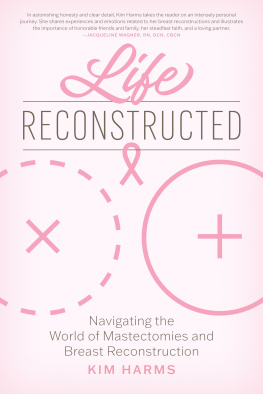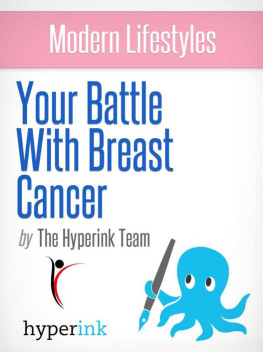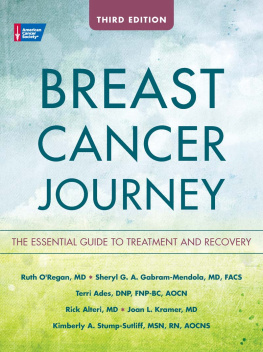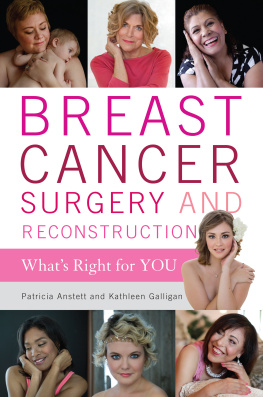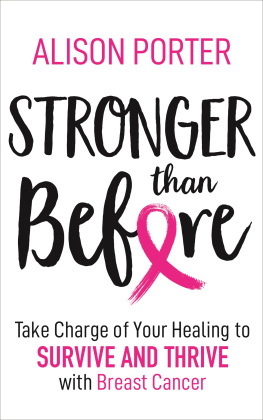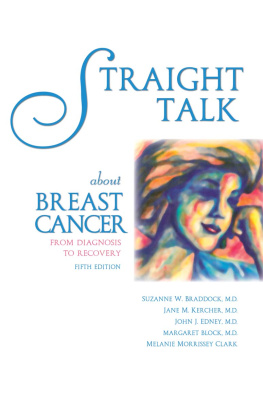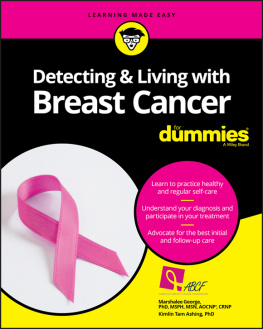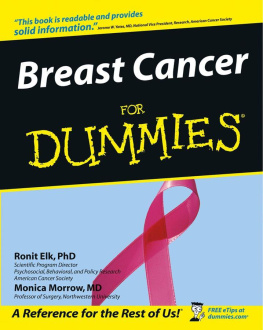Chapter 1
Open to the Front: The Humbling Experience of Sharing Your Breasts with So Many People
Beautiful girl, you can do hard things.
Unknown
Put this on, please. And make sure its open to the front.
I quickly lost count of the number of times I heard that phrase coming from the mouth of a person wearing scrubs and holding out a pink paper vest.
There was something otherworldly about repeatedly slipping into a crinkly pink vest, knowing a few short minutes later Id have to take it back off so a stranger in a white lab coat could get up close and personal with my boobs. Add to that awkwardness my brain struggling to wrap itself around the fact that I had cancer, and it was like Id stepped out of normal life and into some sort of demented alternate reality.
On one hand, I totally wanted all the smart medical people to look at my boobs and squeeze them and push on them and photograph them and do all the things they needed to do to get me on my way to complete healing. On the other hand, I wanted to grab my magic blanket (my BFF gave me a sherpa blanket after my diagnosis), curl up in a ball on the floor in front of my fireplace, and just sleep until the whole thing was over.
When It Feels Like Your Boobs Are Public Property
It started with Dr. Testroet. Shes our family doctor, shes my age, and I kind of feel like shes my friend. Ive even considered pretending I was sick so I could sneak a couple coffees into the exam room and sit and chat with her about books and backpacking. But show her my boobs? Nah. That thought never crossed my mind.
Then on a cold and windy day in January 2016, I found a weird lump in my left breast and thought, Oh crap. I should probably have that looked at. So off to Dr. Testroet I went. I really wasnt worried at that point. I was only forty years old and had no breast cancer in my family history. A little voice in my head kept telling me I was being silly for even making the appointment and wasting the hard-earned money in our health savings account. Certainly it was nothing to be concerned about. I never imagined that I would soon hear those awful words, You have breast cancer, and that Dr. Testroet would be the first of many people in the medical field to view and feel my breasts that year.
The mammogram lady was breast-toucher number two. Then it was the ultrasound lady, followed by the radiologist who did the biopsy. Then on to the general surgeon. Then plastic surgeon number one. (He is one I would rather forget. You will learn more about him in Chapter 4.) Then on to plastic surgeon number two. Then it was the oncologist and his assistant. Sprinkled into that mix were lots of nurses and three doctors in training:
Do you mind if so-and-so sits in on this appointment? Hes working on his residency...
Thats fine was my verbal answer, but internally the words were considerably more sarcasticWhy, of course not. I want to show my boobs to as many people as possible before they are removed from my body and sent into the great unknown.
The whole experience was super weird for me. Please know that if its super weird for you too, you are not alone.
Thoughts from Women Who Have Been There
When Rachel was in her early teens, her mom was diagnosed with breast cancer. After treatment she lived cancer-free for several years, but it eventually came back and took her life when Rachel was in college, so Rachel knew from an early age that she would have to keep a close watch on her own breast health. But even with that knowledge, repeatedly revealing her boobs was really strange at first.
The pictures [they took of my boobs] were really weird, but I remember the doctor talking about it afterward and [learning] that my pictures were going to end up in a reference book for other women in the same position as me.... Instead of being really weirded out by that, I thought about how thankful I was to have had the opportunity to flip through pages of before-and-after photos. When I thought about it that way, I didnt mind so much, she said. Plus, my doctors worked hard to make it feel like it was okay, and that it was just another body part. I got used to it over time. (Many plastic surgeons take before-and-after photographs from the neck down and keep an album for new patients to view prior to their surgeries.)
Amber quickly became desensitized to exposing her boobs. At the beginning, she kept track of the number of people who looked at her breasts, but as that amount grew and grew through chemotherapy, radiation, and surgeries, she stopped counting. Showing my breasts became normal; it lost the feel of being an intimate, private, sexual experience and became clinical, she said. I still feel that way. Maybe because they are man-made!
Krystal can relate to the clinical feeling. In fact, after going through the mastectomy and breast reconstruction process, she now feels comfortable showing her new breasts to other women to educate them about the process. Ive accepted that these are my new boobs, and when I explain what Ive had done, sometimes its easier to just show them, she said.
Cathy remembers the awkwardness of the first time she bared her breasts in her cancer journey. It was with her radiologist. He attended the same large church where Cathy led the drama ministry. He knew her because of her presence in ministry, but she didnt recognize him. So he casually chatted with her about their church connection and then abruptly switched from small talk to Lets take a look at your breasts. Cathy had a hard time with the transition. It just seemed so surreal. Such an easy transition for him and downright shocking to me.
She gradually grew used to the open to the front routine, but as her treatment was wrapping up, her reconstructive surgeon threw her for a loop. As he examined her healed breasts at a follow-up appointment after surgery, he stood back to admire his handiwork and said, Thats one of the best reconstructions Ive ever seen.
We cant control what doctors, nurses, and other medical professionals say and do as they examine this intimate part of our bodies, but we can control how we handle the situation. Like everything in life, this whole out-of-this-world scenario will be easier for some people to deal with than others. If its not uncomfortable for you, thats fantastic! One less thing to stress over throughout treatment. You might just want to skim through the rest of this chapter and move on to other topics. But if you are finding it difficult to make your way through these open to the front appointments, read on for some thoughts on coping.
Ideas for Coping with Repeated Boob Exposure
Regardless of where you land on the comfort-level spectrum, being thrown into a world where you have no choice but to repeatedly reveal your breasts while processing the fact that you have cancer is not a cakewalk. So dont try to pretend it is. Go ahead and settle in to that hard place. Cry all the tears. Get good and angry. Cover your face with a pillow and scream. Buy a punching bag and smack it around. Whatever you need to do to release the tension, the discomfort, and the fear, do that thing. And when you head into that exam room where it is inappropriate to scream and punch things, consider trying one of the following coping mechanisms:
Think of your situation as a challenge rather than a threat. According to wellness coach and stress management specialist Elizabeth Scott, Research shows that viewing something as a challenge helps you to mobilize your resources and bring your A game to the situation more easily, while viewing the same situation as a threat can lead to a greater tendency to feel stressed and shut down.
Focus on breathing. Deep abdominal breathing has actual physical benefits. According to an article published by Harvard Medical School, deep abdominal breathing encourages full oxygen exchange, and doing so can slow the heartbeat and stabilize or even lower blood pressure. (See sidebar for breathing techniques.)
Next page
